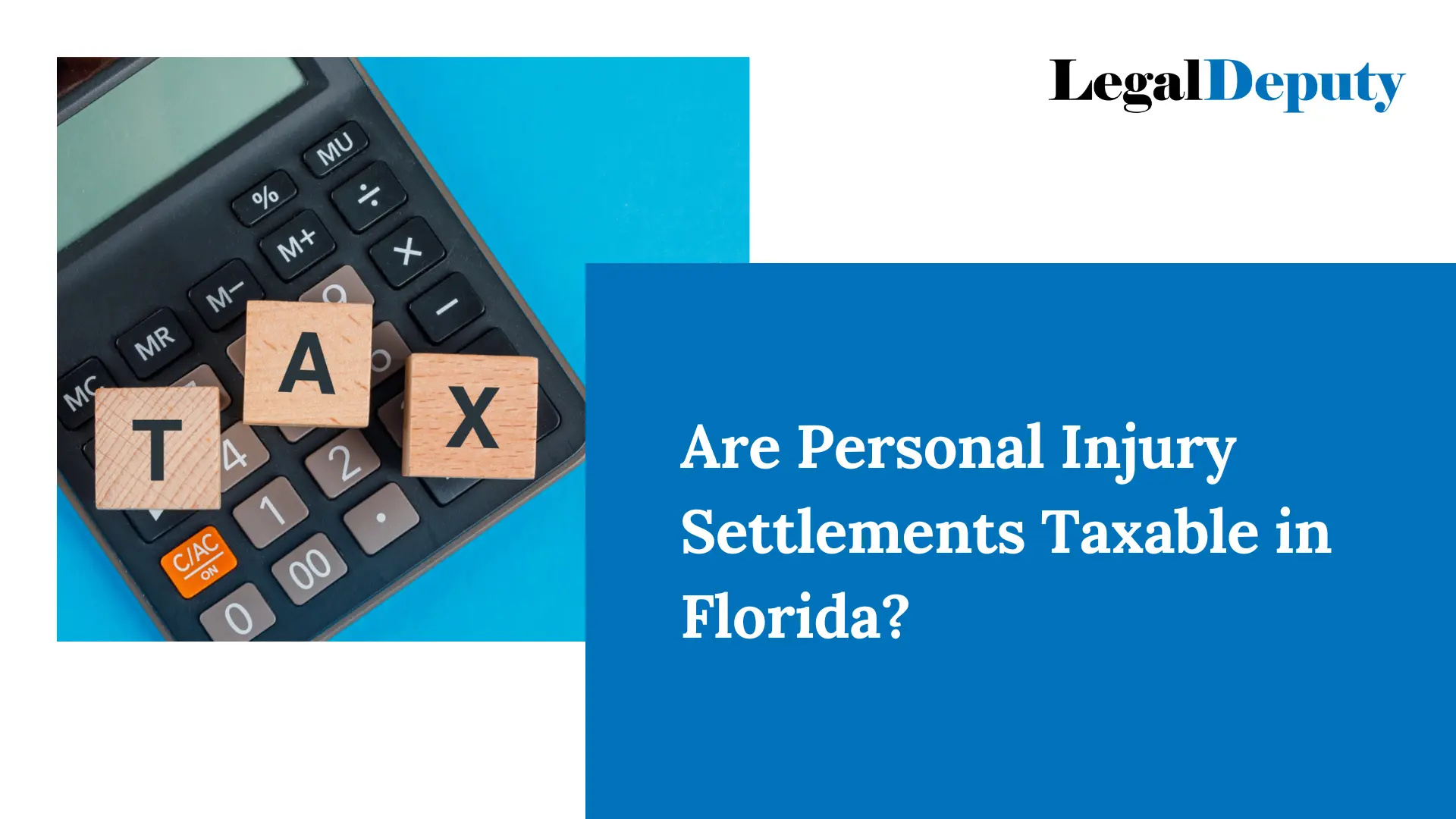Are Personal Injury Settlements Taxable in Florida? An Ultimate Guide
If you’ve recently received a personal injury settlement or are expecting one in Florida, a common question might come to mind: “Is my settlement taxable?” Understanding the tax implications can help you manage your finances effectively and avoid any surprises when tax season arrives. In this article, we’ll break down the details of personal injury settlements in Florida, how they are taxed (if at all), and what factors could influence whether you owe taxes on the amount received.
What is a Personal Injury Settlement?
A personal injury settlement is a financial agreement between the injured party (plaintiff) and the at-fault party (defendant) or their insurance company. These settlements are meant to compensate the plaintiff for injuries sustained due to another’s negligence. Compensation can cover various costs, such as:
- Medical expenses (current and future)
- Lost wages (past and future earnings)
- Pain and suffering
- Emotional distress
- Property damage
Are Personal Injury Settlements Taxable in Florida?

Generally speaking, personal injury settlements are not taxable in Florida. The Internal Revenue Service (IRS) typically excludes these settlements from gross income, meaning that the compensation for personal injuries or physical sickness is usually not taxed. However, this rule comes with some important exceptions.
1. Compensation for Physical Injuries and Sickness
The IRS considers compensation for physical injuries or sickness as non-taxable. For example, if you were injured in a car accident and received a settlement covering your medical expenses, lost wages, pain, and suffering, that portion of the settlement is not taxable. This applies as long as the damages are directly related to a physical injury or physical sickness.
2. Emotional Distress and Mental Anguish
While personal injury settlements for physical injuries are generally non-taxable, the rules can differ when it comes to compensation for emotional distress or mental anguish. If these are directly related to a physical injury, they are typically non-taxable. However, if the emotional distress does not stem from a physical injury, it may be considered taxable income.
For example, if you receive compensation solely for emotional distress without any physical injury, you might have to pay taxes on that amount. Always consult with a tax professional to clarify your specific situation.
Want a Free Consultation?
3. Lost Wages or Lost Profits
Lost wages or lost profits compensation can be a bit tricky. If your settlement includes compensation for lost wages due to time off work or lost business profits, that amount may be considered taxable income. The IRS views lost wages similarly to regular income, which would ordinarily be subject to income tax.
4. Interest on Settlements
If your settlement includes interest, this portion is generally taxable. Interest could accumulate if there is a delay in the settlement payment, and the IRS considers this interest to be taxable income.
5. Punitive Damages
Punitive damages are another category that is taxable. These damages are awarded to punish the defendant rather than compensate the plaintiff for specific losses. In Florida, any punitive damages awarded in addition to compensatory damages are considered taxable by both the state and federal government.
Key Factors That Influence the Taxability of Settlements in Florida
There are a few key factors that can influence whether your settlement is taxable:

- Nature of the Settlement: Is it compensatory (meant to cover actual losses) or punitive (intended to punish the defendant)?
- Type of Damages Awarded: Are they related to physical injury, emotional distress, lost wages, or property damage?
- Specific Allocation in the Settlement Agreement: The settlement agreement should clearly specify the allocation for different types of damages, as this can affect the tax treatment.
Steps to help you determine if any portion of your settlement is taxable:
All Cases End in Huge Payouts
- Review Your Settlement Agreement: The agreement should outline the breakdown of the compensation, including what is for medical expenses, lost wages, emotional distress, and punitive damages.
- Consult a Tax Professional: Given the complexity of tax laws, it is advisable to consult a tax professional who can interpret the specifics of your settlement and advise you on the potential tax implications.
- Keep Detailed Records: Maintain detailed records of all settlement-related documents, including medical expenses, receipts, and correspondence with your attorney and insurance companies.
Special Considerations for Personal Injury Settlements in Florida
Florida has specific laws and considerations that might affect your settlement, including:
- No-Fault Insurance Laws: Florida follows a no-fault insurance system, which means your insurance company might cover some of your medical expenses regardless of who is at fault. This could impact how your settlement is structured and taxed.
- State vs. Federal Tax Rules: While Florida does not impose a state income tax, you may still be subject to federal tax rules. It’s essential to distinguish between the two and ensure compliance with both.
Want a Free Consultation?
Conclusion
In Florida, personal injury settlements are generally not taxable, especially if they are compensating for physical injuries. However, certain portions of the settlement—such as those covering lost wages, interest, or punitive damages—may be taxable. Understanding these distinctions is essential for managing your settlement wisely and avoiding unexpected tax liabilities.
To ensure you navigate your personal injury settlement correctly, it’s always best to consult with a tax professional or attorney. Proper planning and advice can help you maximize your settlement while minimizing any potential tax impact.
Frequently Asked Questions
1. Are all personal injury settlements in Florida completely tax-free?
Not all personal injury settlements are entirely tax-free. While compensation for physical injuries or sickness is generally non-taxable, other components like punitive damages, interest, and lost wages may be taxable. It is important to identify which parts of your settlement could be subject to taxes.
2. How do I know which parts of my settlement are taxable?
The settlement agreement should clearly outline the breakdown of different types of compensation. Generally, compensation for physical injuries is non-taxable, but amounts for lost wages, punitive damages, or interest are taxable. Review your agreement carefully and consult with a tax professional for a precise determination.
3. If I receive a settlement for emotional distress, is it taxable?
Compensation for emotional distress is taxable if it does not originate from a physical injury or sickness. If the emotional distress stems from a physical injury, it is generally non-taxable. However, any compensation for emotional distress that is not connected to a physical injury may be considered taxable by the IRS.
4. Do I need to report a non-taxable settlement to the IRS?
If your entire settlement is non-taxable, you generally do not need to report it to the IRS. However, if any portion of your settlement is taxable, you must report that portion on your federal income tax return. Consult with a tax professional to ensure compliance with IRS rules.
5. Can I deduct the medical expenses covered by my settlement?
If you previously deducted medical expenses that were later reimbursed by your settlement, you must include that amount as income in the year you receive the settlement. You cannot deduct medical expenses that were covered by the settlement in your tax return.
Related Blogs:
7 Reasons Your Personal Injury Case May Go To Trial
How Much is a Typical Injury Settlement?
Disclaimer:
The information provided in this blog, “Are Personal Injury Settlements Taxable in Florida?”, is intended for general informational purposes only and does not constitute legal advice. While we strive to provide accurate and up-to-date information, the content of this blog may not reflect the most current legal developments or interpretations.
Readers should not act or refrain from acting based on the information contained herein without seeking appropriate legal or other professional advice on the specific facts and circumstances at issue from a licensed attorney in the relevant jurisdiction. This blog is not intended to create, and receipt of it does not constitute, an attorney-client relationship between the reader and the author or the author’s affiliated organization.
All liability with respect to actions taken or not taken based on the contents of this blog is expressly disclaimed. The information is provided “as is”; no representations are made that the content is error-free.
For specific legal advice regarding your personal injury case or any other legal matters, please consult with a qualified legal professional.







